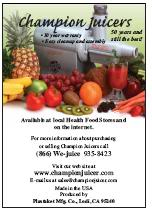The mad dash from when your alarm clock goes off until you race to your car is no excuse to skip the best meal of the day: breakfast. From eggs to oatmeal, breakfast has much to offer in terms of great taste and nutrition to start the day off right whether it’s a quick or a leisurely meal.
But as the number of healthy breakfast choices are growing, so too are the less-than-beneficial temptations. “It seems the American breakfast experience is evolving and eroding at the same time,” says Steve Warnert, director of sales and marketing of Amy’s Kitchen, Santa Rosa, CA. “Breakfast is the most important meal, provided we make good choices about what to eat. Sweet cereals and coffee-shop pastries do not fit into the description of a ‘healthy start’ to the day.”
It’s up to retailers to highlight wholesome and nutritious breakfast choices as the best way to get the gears going in the morning. And, there’s much to talk about, says Warnert: “New and better cereals (granolas, muesli, whole grain) and yogurts (dairy and non-dairy) are appearing on supermarket shelves.”
Ingredients That Bring Home the Bacon
Traditional cereal makers know better than anyone that what’s on the box counts. Using prizes and cartoon characters, they have mastered the art of grabbing shoppers’ attention. But, it takes more than this to get breakfast foods to fly off shelves like hot cakes in natural products stores. Our savvy shoppers are more impressed with certain healthy ingredients and labels claims.
Says Sara Loveday, a spokesperson for Horizon, Boulder, CO, “Consumers are looking for more from breakfast foods, and added functional ingredients are increasing in demand.”
 High fiber, low sugar. Last month, Tates & Lyle released data indicating that shoppers were more apt to buy a food product if it stated it is an “excellent source of fiber.” This was particularly the case with dairy, cereal and bread items (see WholeFoods, October 2009, p. 59).
High fiber, low sugar. Last month, Tates & Lyle released data indicating that shoppers were more apt to buy a food product if it stated it is an “excellent source of fiber.” This was particularly the case with dairy, cereal and bread items (see WholeFoods, October 2009, p. 59).
The reason for increased interest in fiber, says Michael Smulders, founder of Bakery On Main, Glastonbury, CT, may be the understanding that it is “very important for cardiovascular and digestive benefits.” As a bulking agent, fiber helps foods properly pass through the digestive system while offering satiety; it is said to lower LDL cholesterol and help prevent heart disease; and it helps control blood sugar.
Consumers interested in these benefits are often also in tune with their sugar intake and feel the less sugar the better. Katharine Schuler, director of marketing communications at U.S. Mills, LLC, Needham, MA, points out that in August, the American Heart Association issued a scientific statement that Americans should reduce their sugar intake. “While we have known for years that Americans overindulge when it comes to added sugars, this new statement by the AHA recommends an upper limit of added sugars consumption for men and women.” These limits are 100
calories/day (six teaspoons) for women and 150 calories/day (nine teaspoons) for men.
It’s easy to load up on sugar with mainstream options. A 2008 Consumer Reports investigation of 11 popular cereals marketed to children found nine were more than 40% sugar by weight and two were half sugar by weight (1). So, many consumers are giving all-natural and organic cereals, oatmeal and granola a second look, as mainstream options often have way too much sugar.
“[They] are looking for healthier options,” says Schuler, whose company (U.S. Mills) offers a variety of breakfast products including ready-to-eat cereals, oatmeal, hot cereals and cereal bars under the brand names Uncle Sam, Erewhon, and Farina. “Uncle Sam Cereal is recommended by physicians, dietitians, diabetes educators and weight-loss books because it is high fiber, low in sugars and has omega-3s from flaxseed,” she says.
 Says Smulders, “Clearly, consumers want better health and great taste,” who agrees that shoppers are seeking out reduced-sugar breakfast options. “We also make Fiber Power granola, a wheat-free product that contains nine grams of fiber per serving and no cane sugar,” he says.
Says Smulders, “Clearly, consumers want better health and great taste,” who agrees that shoppers are seeking out reduced-sugar breakfast options. “We also make Fiber Power granola, a wheat-free product that contains nine grams of fiber per serving and no cane sugar,” he says.
Breakfast food makers are getting creative with great whole-grains that also satisfy the need for another important label claim: gluten free. With the rise in shoppers turning to healthy, gluten-free food options, it’s important to offer high-fiber breakfast options for those looking to manage gluten intolerances, Celiac disease and other conditions. Says Maria Emmer-Aanes, director of marketing and communications at Nature’s Path, Richmond, BC, Canada, “We believe alternative grains are gaining in popularity, especially gluten-free grains such as quinoa, amaranth, buckwheat, spelt and kamut. These ancient grains are also easier to digest.”
New options in the gluten-free cereal arena include Erewhon Strawberry Crisp and Erewhon Cocoa Crispy Brown Rice, which have received the Kid Kritics Seal of Approval, according to Schuler of U.S. Mills.
One company that has thought outside the box with respect to grains is Torrington, CT-based Holly’s Oatmeal, maker of various multigrain hot cereals. “Most people don’t like oatmeal because of the texture,” says Holly DiMauro, the company’s founder and president. “I combined various grains with rolled oats. What that does is give you a creamy, chewy texture. Our product isn’t just oats.” The grains in her Wickedly Plain oatmeal, for example, include whole grain oats, rolled whole wheat, rye, barley, triticale, oat bran, 7-grain cereal, Scottish oats, quinoa, amaranth, soy grits, flaxseeds and flax meal. One flavor even includes antioxidant-rich goji berries. “Our hot cereal has 38 grams of whole grains in one serving. Your daily intake is supposed to be 48,” says DiMauro. “Whole grains is so important in the diet, and it’s something that most Americans lack.”
Also unique to the Holly’s Oatmeal line are gluten-free options, which DiMauro says is “the hottest thing right now” among her offerings. “It tested at 0.05 parts per million of gluten. FDA allows 20 parts per million or more of gluten to be considered gluten free,” she says.
Omegas. Omega-3s also are a selling point in Breakfast Land. “DHA omega-3s are increasingly popular due to the health benefits of this nutrient,” says Loveday. “Omega-3s are fatty acids which have been studied for their role in health and well-being. DHA is one type of omega-3 nutrient that has been studied for its role in heart, brain and eye health.” Consumers have taken note of this fact and are looking for DHA wherever they can get it. To meet this need, Horizon’s Organic Milk Plus DHA is made with vegetarian DHA. And, some egg suppliers feed hens a special diet that produces DHA-rich eggs.
On the boxed goods side, more and more companies are formulating granolas and cereals with flaxseed to offer shoppers the benefits of ALA, which metabolizes into DHA. “The health benefits of flaxseed have been talked about for years and as more studies reinforce these benefits, more consumers look for ways to incorporate it into their diets,” says Schuler citing a 2009 American Journal of Clinical Nutrition article in which “significant reductions [in total and LDL cholesterol] were observed with whole flaxseed and lignan supplements, but not with flaxseed oil” (2).
 Cruelty-free and hormone-free. Ingredients aren’t the only part of the label striking a cord with consumers. Shoppers buying animal-derived breakfast items like milk, eggs and bacon want to know farmers are treating their stock well. Consumers are flocking to cage-free eggs as a humane way to get their daily dose of lutein and xeathanthin (for eye health), vitamin D, protein, amino acids and choline (for brain and heart health). Simcha Weinstein, director of marketing for Albert’s Organics (supplier of eggs, juices, milk, yogurt, bacon, ham and sausage), Bridgeport, NJ, points out another great reason to choose cage-free eggs. “Because of the high price differential between organic and conventional eggs, cage-free eggs produced humanely on a vegetarian diet without the use of pesticides have emerged as an economic alternative for consumers seeking a natural egg,” he says.
Cruelty-free and hormone-free. Ingredients aren’t the only part of the label striking a cord with consumers. Shoppers buying animal-derived breakfast items like milk, eggs and bacon want to know farmers are treating their stock well. Consumers are flocking to cage-free eggs as a humane way to get their daily dose of lutein and xeathanthin (for eye health), vitamin D, protein, amino acids and choline (for brain and heart health). Simcha Weinstein, director of marketing for Albert’s Organics (supplier of eggs, juices, milk, yogurt, bacon, ham and sausage), Bridgeport, NJ, points out another great reason to choose cage-free eggs. “Because of the high price differential between organic and conventional eggs, cage-free eggs produced humanely on a vegetarian diet without the use of pesticides have emerged as an economic alternative for consumers seeking a natural egg,” he says.
|
Three Reasons to Make Time for Breakfast
2. Breakfast helps keep your weight down. Several studies indicate a correlation between eating breakfast and having a lower body mass index (BMI). Researchers suspect this may be because a wholesome breakfast may help improve energy and offer satiety, two key factors in keeping one’s weight in check (2). 3. Breakfast offers great nutrition. If you choose the right foods, a healthy breakfast can offer some key nutrients that you’ll need throughout the day. Many natural breakfast options are packed with fiber and whole grains, which support healthy weight, blood sugar, digestion and more. References
|
Along the same vein, Gary Flanagan, president of Shelton’s Poultry Inc., Pomona, CA, observes a similar trend: “For us, the claims are related to the raising of the animals from which the meat is derived like ‘Raised Without Antibiotics.’” His company distributes turkey breakfast links, turkey breakfast sausage patties, turkey breakfast strips and fresh eggs.
Antibiotic- and hormone-free labeling on animal products is important to shoppers who fear that consuming too much of these agents via milk, cheese and meat can have a negative impact on one’s health. Some evidence suggests that hormone-dependent cancers like testicular, prostate and breast may be related to ingesting cow’s milk products that are high in estrogen (3).
These products often are less expensive than organic, too. Weinstein notes, “Antibiotic-free breakfast meats (bacon, ham, sausage) have provided an economic alternative to higher priced organic meats.”
Flanagan agrees that cost is a factor, noting “We have noticed that there is a tendency for consumers to seek less expensive products in all sectors due to the current economical conditions.”
Get it and Go
As much as Americans love eating a hot breakfast, many people are too pressed for time to regularly eat a big meal in the morning. But, this doesn’t mean they can’t have their pancakes and eat them, too. Industry companies are regularly launching breakfast options that take little or no time to prepare.
Unfortunately, quick options have gotten a bad wrap thanks to the popularity of some sugar-laden, high-carb options on the mainstream market. “’Grab and Go’ doesn’t have to suggest poor quality or lacking nutrition,” says Warnert of Amy’s Kitchen. “These types of foods are hoping to address the issue of too little time and the demand for something quick and easy. There’s no reason the quality has to decline in order to satisfy consumer demand for convenience.”
To pack in as much nutrition as possible in quick food options, “[Nature’s Path tries] makes cereals, bars, frozen waffles and hot oatmeals as nutritious as possible, packed with ancient and whole grains and superfoods like flax and hemp seeds,” says Emmer-Aanes. “We also offer our bars in rip-top caddies because consumers like single-serve portable options.” The firm also offers toaster pastries and pancake mixes.
Warnert highlights several frozen breakfast options from Amy’s Kitchen for “people who want a nourishing breakfast, but don’t always have time to cook from scratch.” For example, the firm offers four kinds of Amy’s Hot Cereals, Amy’s Frozen Organic Hot Cereals, a protein-rich Breakfast Burrito and a Breakfast Wrap, and Tofu Scramble and the Mexican Scramble frozen meals.
 Horizon recently launched Tuberz, organic yogurt tubes (Surfin’ Strawberry, Blueberry Wave, Strawberry Lemonade Squeeze and Sour Apple Spray) and Little Blends for people who want to eat their yogurt on the go.
Horizon recently launched Tuberz, organic yogurt tubes (Surfin’ Strawberry, Blueberry Wave, Strawberry Lemonade Squeeze and Sour Apple Spray) and Little Blends for people who want to eat their yogurt on the go.
Granola, bars, cereal and oatmeal are also great options for a quick, healthy breakfast. To meet consumer interest in this area, Smulders says, “[Bakery on Main] has developed portable foods for gluten-free consumers such as gluten-free granola snack packs and gluten-free granola bars.”
And, DiMauro says her oatmeal cooks in six minutes on a stovetop or three-and-a-half minutes in the microwave.
All this talk of quick breakfasts shouldn’t overshadow traditional category options like eggs, juices, milk and yogurt. They are still very much in demand, in fact. According to Weinstein, “Consumer support for traditional breakfast foods (breakfast meats, eggs, juices, milk, yogurt) remain strong. All those categories show positive growth for 2009 versus 2008.” WF
References
- M. Fox, “Some U.S. Cereals More than Half Sugar: Report,” Reuters, October 1, 2008.
- A. Pan, et al., “Meta-Analysis of the Effects of Flaxseed Interventions on Blood Lipids,” Am. J. Clin. Nutr. 90, 288–297 (2009).
- J. Shaw, “Modern Milk,” Harvard Magazine, May–June 2007.
Published in WholeFoods Magazine, Nov. 2009


 1. Kids who eat breakfast perform better in school. In one study, 4,000 elementary school children were given short-term memory tests. Those who ate breakfast performed better than those who skipped it. And, kids who ate whole grains like oatmeal had sustained energy through the morning, while those that consumed sugary cereals had a peak and then a distinct fall in energy. In a separate study, kids that ate oatmeal for breakfast performed 20% better on memory exercises than those who ate a sugary cereal (1).
1. Kids who eat breakfast perform better in school. In one study, 4,000 elementary school children were given short-term memory tests. Those who ate breakfast performed better than those who skipped it. And, kids who ate whole grains like oatmeal had sustained energy through the morning, while those that consumed sugary cereals had a peak and then a distinct fall in energy. In a separate study, kids that ate oatmeal for breakfast performed 20% better on memory exercises than those who ate a sugary cereal (1).







